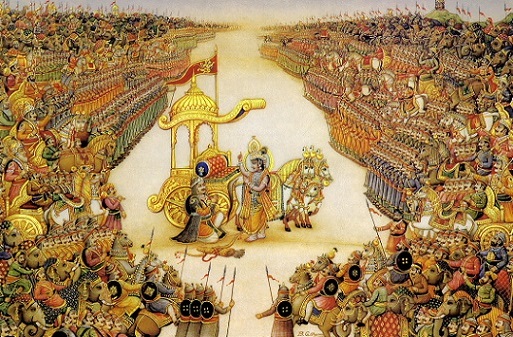(Click to enlarge painting of Krishna advising Arjuna on the Battlefield of Kurukshetra)
"Kapi-dhvajaḥ. Kapi-dhvajaḥ is also significant. Kapi-dhvajaḥ, Arjuna, on his... Just like nowadays also, every nation has different types of flags, so Arjuna also had his flag on the... Dhvajaḥ. Dhvajaḥ means the flag. The flag was on the top of his chariot. And it was marked with Hanumān, Vajrāṅgajī, Vajrāṅgajī, Hanumān, who fought for Lord Rāmacandra. He is fighting for Kṛṣṇa. So he is also following the footsteps of Vajrāṅgajī.
Vaiṣṇavism is like that. Mahājano yena gataḥ sa panthāḥ (CC Madhya 17.186). Mahājano yena gataḥ sa panthāḥ. Vaiṣṇava should follow his previous mahājana, authority. That is Vaiṣṇavism. We don't manufacture ideas. We don't commit such rascaldom. We simply accept the behavior or the activities of previous ācāryas. There is no difficulty. There is no difficulty.
So in the fighting principle, Arjuna is fighting for Kṛṣṇa. He is following the previous fighting ācārya, Hanumānji. Therefore he has depicted his flag with Hanumān, that 'Hanumānji, Vajrāṅgajī, kindly help me.' This is Vaiṣṇavism. 'I have come here to fight for Lord Kṛṣṇa. You fought also for the Lord. Kindly help me.' This is the idea. Kapi-dhvajaḥ. So any activities of the Vaiṣṇava, they should always pray to the previous ācārya, 'Kindly help me. Kindly...' This is, Vaiṣṇava is always thinking himself helpless, helpless. And begging help from the previous ācārya.
Just like in Caitanya-caritāmṛta you will find, the author, at the end of every chapter:
śrī rūpa-raghunātha-pade yāra āśa
caitanya-caritāmṛta kahe kṛṣṇadāsa
(CC Adi 1.110)
His every line, he is thinking of Rūpa-Raghunātha, previous ācāryas. 'So let me surrender to the gosvāmīs and they will help me how to write.' You cannot write. That is not possible.
So this is Vaiṣṇava's policy. Vaiṣṇava ṭhākura, tomāra kukkura, baliyā janaha more. Bhaktivinoda Ṭhākura has sung, 'My dear vaiṣṇava ṭhākura, you just accept me as your dog, as the dog works by the indication of the master.' He will give his life. Dog has a good qualification. However a strong dog may be, when the master orders, he will give his life. This is dog, faithful, so faithful to the master. So vaiṣṇava ṭhākura... So Bhaktivinoda Ṭhākura is praying, vaiṣṇava ṭhākura, tomāra kukkura, baliyā janaha more: 'My dear vaiṣṇava ṭhākura...' Vaiṣṇava ṭhākura means guru. 'Kindly accept me as your dog.' And he describes, I forget the exact language, that 'I will always try to protect you. As dog keeps watch, so I will watch so nobody will come to disturb you. And whatever little prasādam you'll give me, I'll be satisfied.' That dog's qualification. The master is eating, but the dog will never come, unless the master gives little morsel. He is satisfied. He is satisfied.
So this is Vaiṣṇavism, to follow the previous ācārya. This is Vaiṣṇavism. Mahājano yena gataḥ sa panthāḥ (CC Madhya 17.186), dharmasya tattvaṁ nihitaṁ guhāyāṁ mahājano yena gataḥ.... Tarko 'pratiṣṭhaḥ śrutayo vibhinnā. Tarko, if you are very great logician, you can argue, 'Oh why Kṛṣṇa can be God? I can be God,' by logic you may defeat an ignorant devotee, but śāstra says by becoming a big logician, you cannot understand transcendental knowledge. Transcendental knowledge you have to understand by submitting, praṇipātena, tad viddhi praṇipātena (BG. 4.34). First of all surrender. Tad viddhi. If you want to know this transcendental science, then you must fully surrender. This is first qualification. Tad viddhi praṇipātena paripraśnena sevayā. Three things. First surrender; then if you cannot understand, then you question. Otherwise you have no right to question from a Vaiṣṇava.
Not that 'Can you show me God?' What qualification you have got? You want to see God. Another rascal will say 'Yes, I will show you God. Come to me. I shall show you God.' This is going on. One rascal inquires, 'Can you show me God?' and the big rascal says, 'Yes, come to me alone. I shall show you God.' This business is going on. God's seeing is so cheap thing that any rascal comes, 'Can you show me God,' and another rascal says, 'Yes, come to me. In the evening I shall show you.' That means if he is a foolish rascal, then he will show him something magic, and he will understand, 'Oh I have seen God.' That's all, finished. God-seeing business is finished. And he comes... After God-seeing, he is the same, the same rascal. What improvement you have... You have seen God. What improvement you have made? God seeing is so cheap thing? No.
So we should be very careful. If we actually are interested in understanding... Manuṣyāṇāṁ. It is not so easy."
(Srila Prabhupada Lecture, London, July 17, 1973)
.
